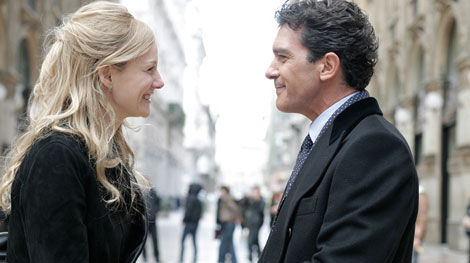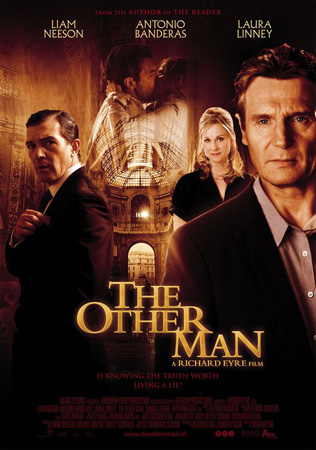After reading a note from his wife Laura (Laura Linney), Peter (Liam Neeson) discovers that she's been having an affair. His reaction to the discovery of this "other man" (Antonio Banderas) and his wife's motives in leaving him a clue are the basis of the upcoming film The Other Man. I recently got a chance to participate in a round table discussion with Linney and Banderas about their roles, the film's morality questions and why this film could never have been made in Hollywood.
Oscar-nominated actress Linney was fascinated by the role of the enigmatic Laura, but it wasn't the reason she took the job. "I wasn't really attracted to the role, honestly. I was attracted to doing a movie, being able to work with Liam again, working with [writer/director] Richard Erye again, getting to know Antonio and work with him. So it was really more...I said yes almost before I'd even read the script. I didn't even need to read the script. I just said yes and then read the script. And I was like, okay, this is my challenge. Here is my challenge now. So that was sort of more why I did it."
Banderas agreed that it was about the quality of the people involved, saying he has a tremendous amount of respect for Neeson and Eyre. He told us that the role of Ralph, the other man, was a challenging one for him. "I was more troubled by the character...in terms of knowing that I have to step into territory that was unknown...a type of nakedness. A separation [from] the kind of characters I have been doing the last 15, 20 years. It related to me, when I read the script for the first time, in some of the characters, in terms of risks...and when I met Richard, he confirmed that...'I know you're not afraid to expose yourself in pieces, and go for the character like that.' That is, in a way, quite pathetic, if you will. He's a man with a double life...in a way he's rewarded, because she's a woman with a life. She's living in a happy environment...happy is probably too big of a word, but with joy. But in my case, no. In my case the only thing real that I have is her. If I don't have her, I'm a nobody, and pretending the whole entire time to be somebody else. It's quite uncomfortable to attack a character like that. You know? But I think that is exactly what Richard Eyre was looking for...'here is a cliff and you have to jump,'" he was told. "I don't know if at the end of this jump there will be rocks or you're going to find water, but that's the whole entire feeling I had while I was doing the movie."

Eyre is known for his work in the theater. In fact, he directed Linney and Neeson in a production of The Crucible this past Spring. The film itself feels like a small stage production, with distinct acts, and a tiny cast. It takes place in some lovely locals, but one gets the feeling that the story wouldn't suffer in a black box theater. Linney told us that directors who've worked in theater often understand actors better than those that deal strictly with film, and she appreciated the longer rehearsal process.
The film poses questions about love and morality, and Linney said that's sort of the point. Why does Laura cheat? Why does she leave her husband clues about the affair? Does she really want him to find out? Which one of them is actually the other man? "It's complicated," Linney said. "I mean...I think there's great value in looking at it from both perspectives. And it's sort of that way throughout the entire film. You can take one viewpoint and one philosophy and watch the movie with that philosophy, and it will be a completely different experience than watching it with a different philosophy...I'm finding that I'm having a very hard time talking about it. Or being clear. I'm contradicting myself all over the place whenever I discuss this film." She explained that the note she leaves Peter, which reads "Lake Como," could be interpreted as a place she wanted to go with him, or as a device to allow him to discover the affair. And she played it coy when asked which one she believed it was. "Weeell, I wanted to play it so both points of view were possible. I wanted to leave it a mystery." She said that the debate about Laura's motives that will inevitably take place after viewing the film was the whole point.
Banderas had a theory about why Laura chooses to cheat with Ralph. "...there is a certain satisfaction...in taking somebody and making somebody happy. To fulfill the dreams of that person. She sees this man, greets him in a certain way...and provides him with a big chunk of reality. And that chunk of reality is herself. And it's almost like seeing a plant dying and putting some water in, and having the satisfaction of seeing that plant grow. She does it with this person, for reasons that are very unexplainable."
The film was produced outside of Hollywood, and Banderas thinks that allowed them greater freedom to create the film they wanted. "This is a movie that, in Hollywood, would literally have been impossible to make. Because it would have cut the peaks and lows of the movie and make something very edible for audiences. And the movie definitely has a big amount of reflection in it. It doesn't give you straight answers, but the possibility of sitting down in front of a screen and reflecting about things that are very deep into the soul of human beings. That's what I really got at the end of this process."
The Other Man opens in limited release on September 25th, 2009 and is rated R.
